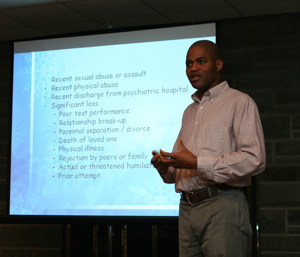Before he was a psychologist at Ithaca College’s Counseling Center, LeBron Rankins dealt with a personal struggle of his own — though, he said, at the time, he didn’t know he was battling depression.

“I felt very disconnected. There was this intense sadness,” he said. “I would be driving and think, I should just drive in front of that truck.”
Rankins shared his experience with depression and suicidal thoughts Monday to students in Klingenstein Lounge, as part of a three-part “Suicide Is Preventable” series sponsored by the Counseling Center and the Rodd D. Brickell Foundation.
The Rodd D. Brickell Foundation is named after a former Ithaca College student who committed suicide in 1985. The Foundation’s mission is to “provide funding for programs, education and research that aid in the prevention of youth suicide,” according to its Web site. In addition to programs like “Suicide Is Preventable,” donations support the college’s Suicide Prevention Hotline and bullying prevention programs in various school systems.
Though the suicide rate at the college is relatively low — only five students have committed suicide since 1982 — it is the third-leading cause of death for 15- to 24-year-olds, according to the Suicide Prevention Resource Center, based in Newton, Mass.
The Counseling Center routinely offers information and services to the college community, but this is the first occasion on which it has independently presented a series geared toward suicide prevention.
The next event, “The Truth about Suicide,” is a film screening March 28. The series will conclude in April with “A Time to Remember: Stories of Remembrance,” which will feature guest speakers sharing their experiences with depression.
Freshman Lee Thorpe, who spoke at the first event, said he fought mental illness throughout high school and into college, and it began to manifest itself in suicidal thoughts. He began counseling when he arrived at the college and said it has helped him tremendously.
“I feel more confident,” he said. “Now I know everything will be fine.”
Suicide is a difficult subject to approach because of stigmas attached to it and to mental health in general, Rankins said. Those affected may not seek help because of the fear that they will be committed to an institution.
“Depression is present in our society,” Rankins said. “People don’t talk about it because it is unknown. It’s easy to fear the unknown.”
Thorpe said seeking counseling is a personal choice.
“It’s what you make of the experience,” he said. “Help is available and it does work.”
Apart from counseling, the Counseling Center offers services like depression screenings, eating disorder screenings and training programs, teaching those involved to detect students in distress.
“We want to help students work toward the goal of being mentally healthy,” Rankins said.
Rankins said signs of suicidal behavior include the giving away of possessions, loss of appetite, not going to class and lack of interest in hobbies.
“You don’t have to be a psychologist to help,” he said. “A caring person can assist a suicidal person.”
As a resident assistant in the East Tower, junior Amanda Lewis attended the lecture because she wanted to be able to recognize the signs of suicidal behavior in her residents.
“I wanted to be aware of the signs and learn how to approach and talk to those who were having those thoughts,” Lewis said.
Lewis also said she realized that students may not always openly talk about their feelings, and said programs like “Suicide Is Preventable” help identify possibly dangerous situations.
“No RA is ever positive about everything that goes on in their residents’ lives,” Lewis said. “It was very helpful to get insights about what some warning signs are.”
Lewis plans to encourage her residents to attend the next event in the series by offering it as a floor program.
“It’s great that [the Counseling Center] offers information about suicide and that it’s available in such a relaxed setting,” she said. “Hopefully you won’t have to use [the skills learned], but you’ll be better prepared if you do.”
Rankins said the ultimate goal of the series is to promote awareness of the help offered by the Counseling Center.
“Depression is treatable,” he said. “We want people to know that help is available.”
More series events
The suicide prevention series will continue with “The Truth about Suicide” at 7 p.m. March 28 in Textor 102 and “A Time to Remember: Stories of Remembrance” at 7 p.m. April 11 in Klingenstein Lounge.







